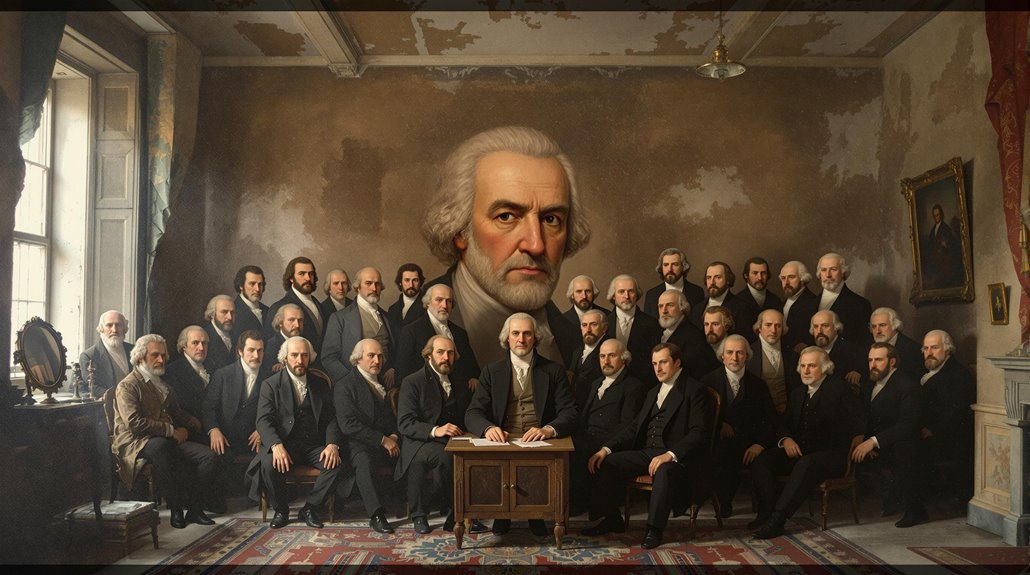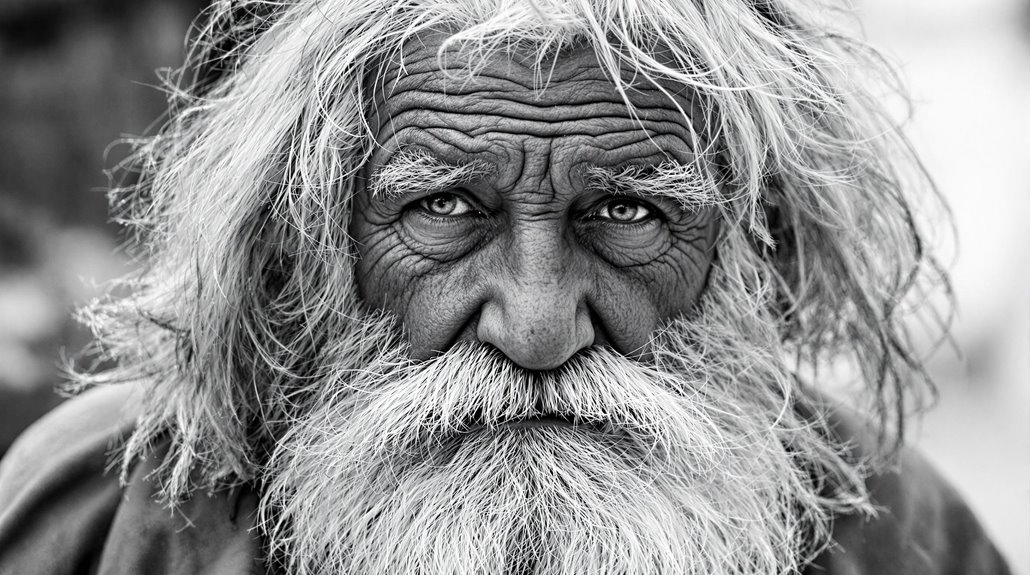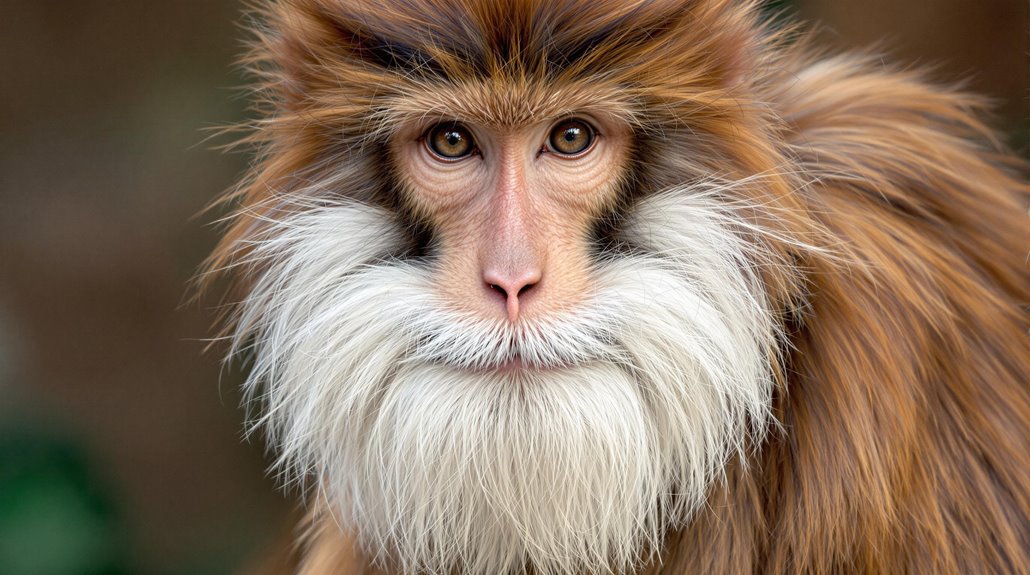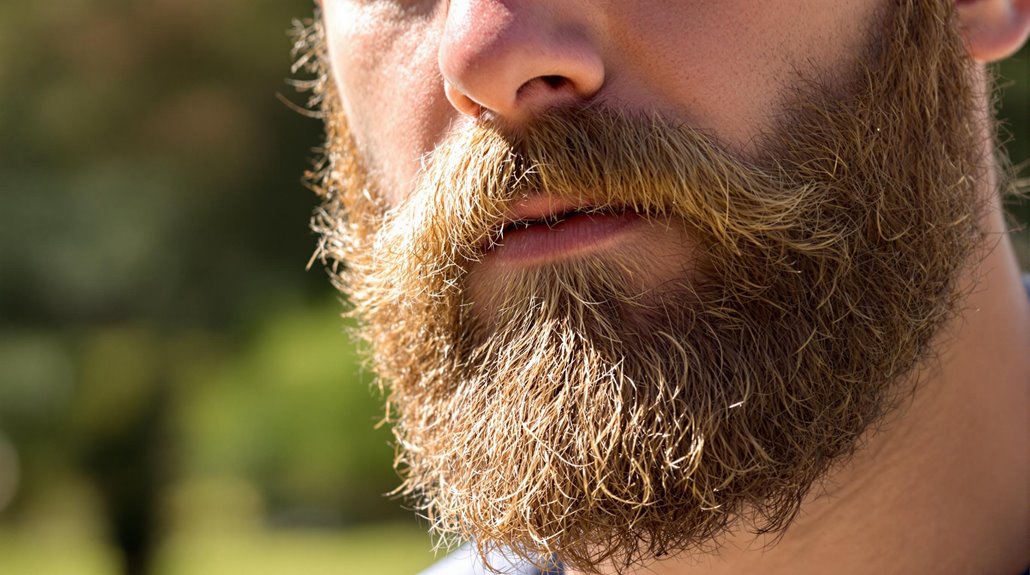Did Odysseus Have a Beard?
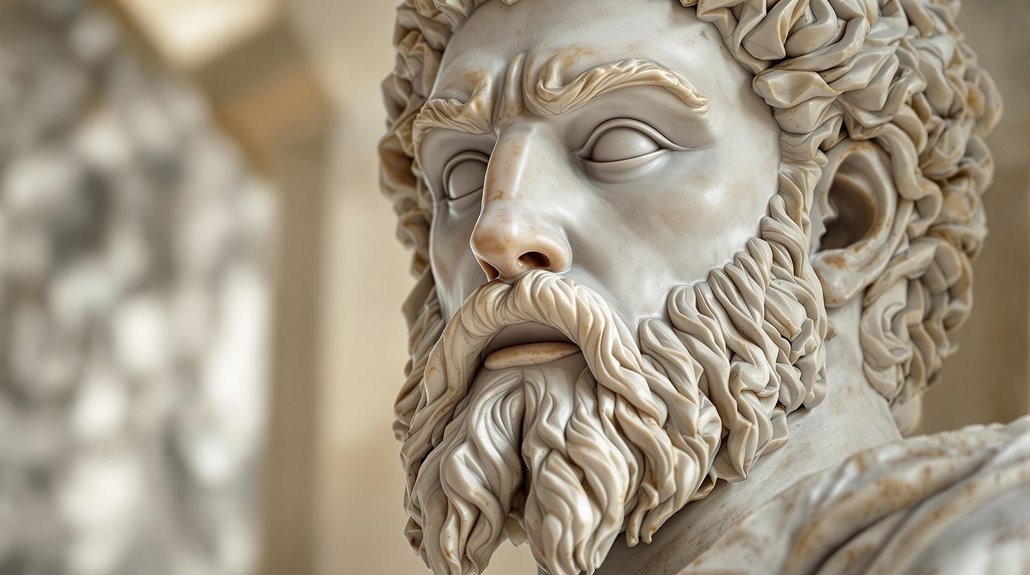
Yes, Odysseus, the clever hero of Homer's Odyssey, is traditionally depicted with a beard. In ancient Greek culture, beards were powerful symbols of wisdom, maturity, and authority. Distinguishable from youthful, clean-shaven heroes like Achilles, Odysseus' beard noticeably set him apart, signifying his status as a seasoned warrior and leader. These depictions extend from ancient Greek vase paintings to modern artistic adaptations, maintaining the beard as an intrinsic part of his identity. If you investigate further, you'll uncover the broader significance of beards in mythology and the unique stories they help to tell.
Odysseus in Greek Mythology
In the world of Greek mythology, Odysseus stands out as a central figure known for his intelligence and cunning. He's the star of Homer's Odyssey, a tale that has him traveling home after the Trojan War, outwitting monsters and gods alike with his quick wit. It's a story that's had rights reserved, but still influences literature and media today.
But it's not just his intellect that sets him apart. You see, Odysseus is always portrayed with a beard, a symbol of maturity and wisdom in ancient Greece. Different from the clean-shaven, young hero Achilles, Odysseus's beard marks him as a seasoned warrior, a leader who's seen and done it all. It's a cultural symbol, one that marks the shift from youth to adulthood.
The character of Odysseus embodies the struggles of the human experience, his epic adventures a quest for identity. His beard, then, reinforces this. It's a reminder of his experience, his wisdom, and his role as a seasoned figure. So next time you think of Odysseus, remember - it's not just his cunning that defines him, but also his beard.
Artistic Depictions of Odysseus
When you look at classical art, you'll often see Odysseus depicted with a beard, a symbol of wisdom, maturity, and experience that sets him apart from youthful heroes like Achilles. This is evident in mediums ranging from ancient Greek vase paintings to Renaissance artworks. Take, for example, the Red-figure painting of Odysseus and Tiresias; his beard emphasizes his role as a seasoned leader, enhancing not only his mature appearance but also his dignified stature in his attire.
Odysseus's companions, too, are often shown as bearded men, reinforcing the societal norms of adulthood and citizenship in ancient Greece. The beard, it seems, became a marker of Odysseus's identity throughout his adventures, a visual cue that helped the audience recognize the hero amid the diverse pantheon of Greek mythology.
The tradition of portraying Odysseus with a beard didn't end with the ancients. It found its place in the Renaissance, evident in Waterhouse's "Odysseus and the Sirens", and continues to persist in modern interpretations of the character in films and video games. It's a reflection of the power of visual symbols in storytelling, especially in shaping the identities of enduring characters like Odysseus.
The Symbolism of Beards
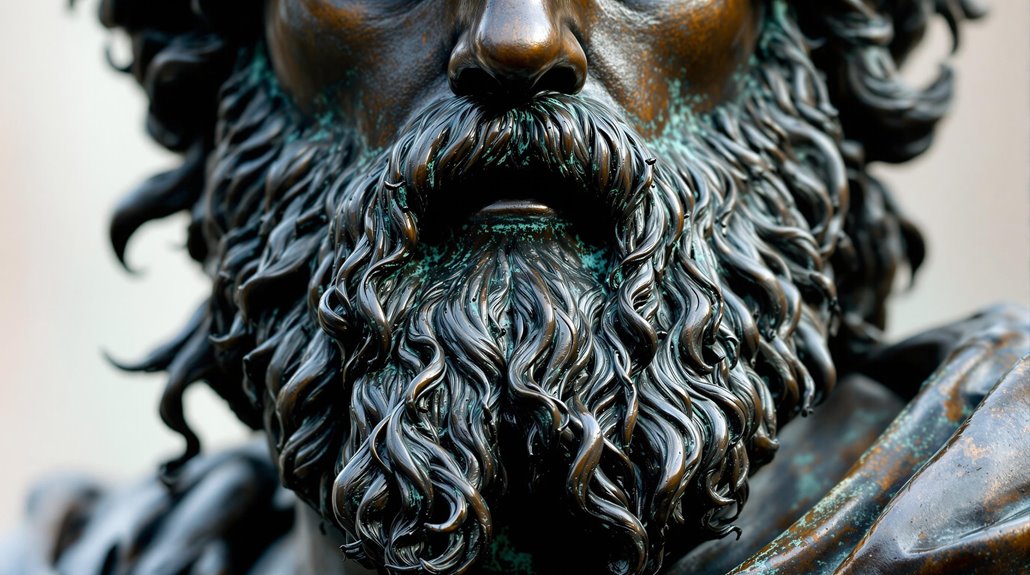
Delving into the symbolism of beards, you'll find that they held a weighty significance in ancient Greece. As an emblem of maturity and social status, a beard was more than just facial hair. It marked the shift from boyhood into manhood and declared one's citizenship.
Odysseus's beard, though we're not discussing it specifically here, is part of this larger cultural significance. It's a symbol of wisdom and experience, setting him apart from younger, clean-shaven heroes. The beard's symbolism didn't stop at individual identity representation. It permeated the societal fabric, affecting perceptions of authority and leadership.
Images of bearded figures in mythology underscored their roles as seasoned warriors, reinforcing the notion that beards were badges of honor. This visual representation in art and literature wasn't an aesthetic choice alone; it influenced audience perceptions, emphasizing wisdom and maturity.
But the beard's symbolism extends beyond ancient Greece. In diverse cultures, it's been a marker of male identity with significant cultural, political, and spiritual implications. So, while we ponder if Odysseus had a beard, we're also exploring a rich tapestry of symbolism and cultural significance.
Odysseus's Beard in Homer's Odyssey
Take a look at classical depictions of Odysseus, and you'll often find him sporting a beard. This isn't just a random stylistic choice, it's a visual cue that speaks volumes about Odysseus's appearance and the symbolism attached to it.
Odysseus's beard is more than just facial hair. It's a cultural marker that signifies maturity, wisdom, and hardened warrior status in ancient Greece. When you think about Odysseus's role as a cunning leader in Homer's Odyssey, the beard perfectly encapsulates his character.
Now, consider how often Odysseus's beard is featured in classic art - vase paintings, sculptures - it's a recurring element that emphasizes his strategic nature and experience. It aligns him with other mature, respected figures in mythology, reinforcing the association of facial hair with authority and wisdom.
This heroic imagery of Odysseus with a beard has influenced modern interpretations of his character too. Regardless of whether it's in films or literature, you'll find these depictions retaining the established imagery from ancient art. So, when asking, "Did Odysseus have a beard?", remember it's not just about the beard, it's about what that beard represents.
Contrasting Bearded and Clean-Shaven Heroes
Ever considered the symbolic significance of a beard in ancient Greek mythology? It's not just a style choice. Hair on a hero's face, or the lack thereof, serves as a visual symbolism, marking a stark maturity contrast.
Visualize the following:
- Odysseus, a seasoned warrior, depicted with a beard, a sign of his experience and wisdom.
- Achilles, the epitome of youthful heroism, frequently portrayed clean-shaven, his face as smooth as his swift moves in battle.
- The bearded Odysseus, a figure of cunning intelligence and endurance, against the clean-shaven Achilles, a manifestation of physical prowess and impulsive energy.
- The varied heroic archetypes, each marked by their facial hair or the absence of it, reflecting their distinct roles and characteristics.
In the vast tapestry of Greek mythology, the beard serves as a silent storyteller, distinguishing between the youthful potential of a clean-shaven hero and the seasoned wisdom of a bearded veteran. The contrast isn't just skin deep, it's a profound statement about the hero's odyssey and their place within the mythological narrative.
Beard: A Sign of Maturity
Stepping into adulthood in ancient Greece was marked by the growth of a beard - a visible sign of maturity, experience, and social status. You see, beard symbolism is deeply embedded in their culture, acting as one of the clear maturity indicators. When a young boy's face began to sprout hair, it was not just a biological transformation. It was a rite of passage, a cultural milestone, indicating that he was now a man.
Odysseus, the seasoned hero of Homer's "Odyssey," was often depicted with a beard. It wasn't merely a fashion statement, but a confirmation of his wisdom and experience. His beard set him apart from youthful heroes like Achilles, emphasizing his authority and resilience.
In Greek iconography, the presence of a beard often improved a character's portrayal as a seasoned leader. Classic art consistently presented bearded figures, reinforcing the cultural significance of facial hair as a marker of maturity and adulthood. So, when you picture Odysseus, imagine him with a beard, a symbol of his maturity and the trials he's endured.
How Beards Define Character in Mythology
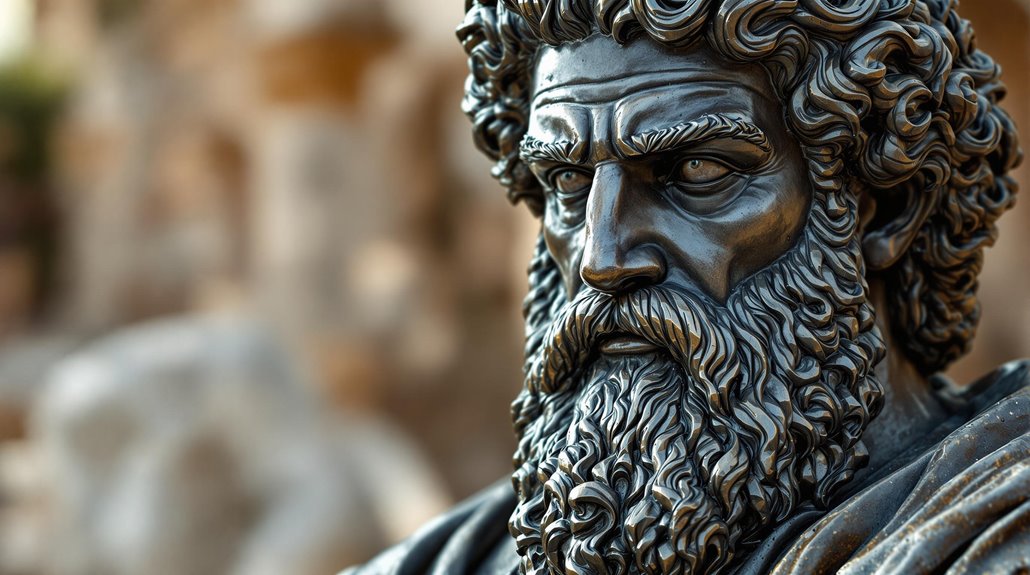
Often, in the enthralling world of mythology, a character's physical appearance plays an essential role in defining their personality and social standing, and beards are no exception. Beard symbolism forms a key part of character development, and Odysseus is a prime example. His beard signifies his maturity, wisdom, and cunning - qualities that set him apart from the youthful, impulsive heroes like Achilles.
This mythological representation of beards isn't unique to Odysseus. Just think about how:
- Zeus, the king of the gods, is invariably depicted with a full, robust beard, signalling his authority and power.
- Poseidon, the god of the sea, sports a beard that mirrors his stormy, unpredictable nature.
- Heracles, despite his divine strength, carries a beard that hints at his human vulnerability.
- Dionysus, the god of wine, often appears with a youthful beard, reflecting his hedonistic lifestyle.
Each beard tells a story, adding layers of depth and complexity to the characters. So, next time you explore mythological tales, take a moment to reflect on the role of the beard. It's more than just a fashion statement; it's a narrative tool.
Modern Interpretations of Odysseus
Almost every modern interpretation of Odysseus honors the traditional image of him with a beard, symbolizing his status as a seasoned warrior and a figure of wisdom in Greek mythology. You'll see this in films and video games, where his bearded persona aligns with the warrior archetype, reinforcing his maturity and experience. The visual contrast between a bearded Odysseus and clean-shaven heroes like Achilles, for instance, underscores maturity and authority in mythological storytelling.
Artistic choices in these adaptations, such as those by Supergiant Games, reflect community feedback emphasizing the importance of accurate representation of mythological figures, including Odysseus's beard. These adaptations aren't just for show; they serve to influence your perception of his character. They cement the beard as an integral aspect of Odysseus's identity, furthering Odysseus's legacy in the process. The beard is more than facial hair; it's a symbol, a statement, and a reflection of the enduring allure of Odysseus's character. As you navigate through these modern interpretations, you're not just witnessing a character—you're experiencing a legend.
The Cultural Impact of Odysseus's Beard
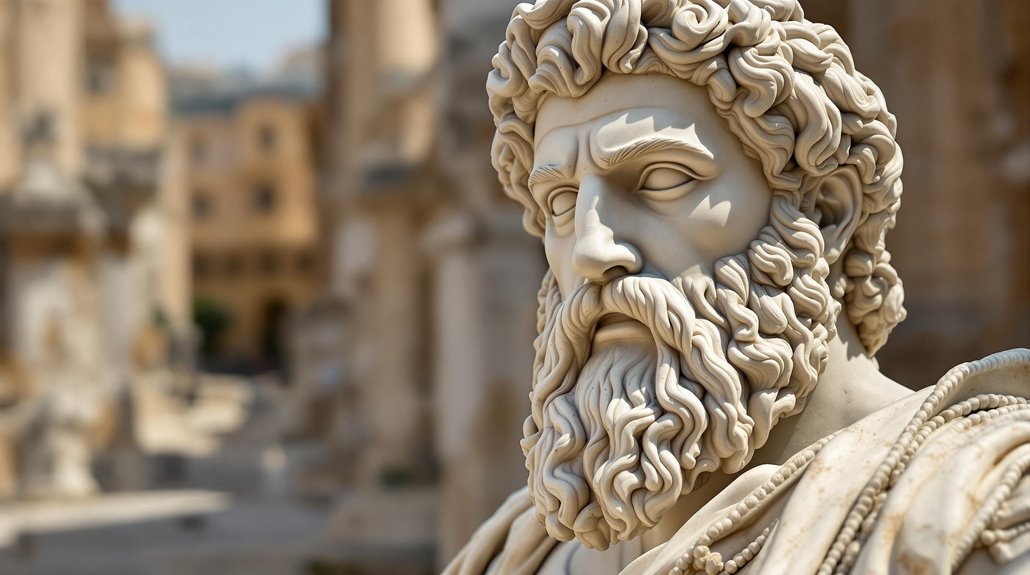
Many aspects of Odysseus's character are symbolized by his beard in both classical and modern art, not least of which are his wisdom, maturity, and the complexities of adulthood. The beard symbolism in his portrayal is a stark contrast to younger, clean-shaven heroes, emphasizing the depth of his character and the challenges he faces throughout his expedition.
This cultural representation has had a significant impact on the way we perceive Odysseus, as the seasoned warrior and leader. His bearded image has made its way into:
- *Ancient vase paintings and sculptures*, where his beard denotes his authority and experience.
- *Cinematic adaptations*, where the beard often represents his wisdom and the trials he has endured, reinforcing his heroic imagery.
- *The domain of video games*, where his beard distinguishes him from other figures, adding a layer of complexity to his character.
- *Literature*, where descriptions of his beard serve to highlight his maturity and the burdens of his quest.
Odysseus's beard, more than just a feature, has become an integral element of his identity, shaping our understanding of the hero across diverse cultural representations.
The Beard's Role in Odysseus's Identity
Odysseus's beard stands as a potent symbol of his character, setting him apart from the less seasoned, clean-shaven heroes in Greek mythology, like Achilles. It's not just about beard symbolism, but an embodiment of his warrior identity. In ancient aesthetics, a beard was a cultural marker of adulthood and social status. Consequently, Odysseus's beard aligns him with the image of a respected king and strategist.
As you traverse classical art, you'll notice Odysseus consistently depicted with a beard. This visual representation reinforces his role as a seasoned warrior and leader, further highlighting his distinct identity. The beard also reflects the trials he endures during his epic quest, signifying the passage of time and personal growth.
Fast forward to modern interpretations of Odysseus in films and games, you'll still find him with a beard. It's an homage to tradition, emphasizing his depth and experience. So, Odysseus's beard isn't just facial hair. It's a symbol of his resilience and wisdom, a critical part of his identity that echoes through history.

